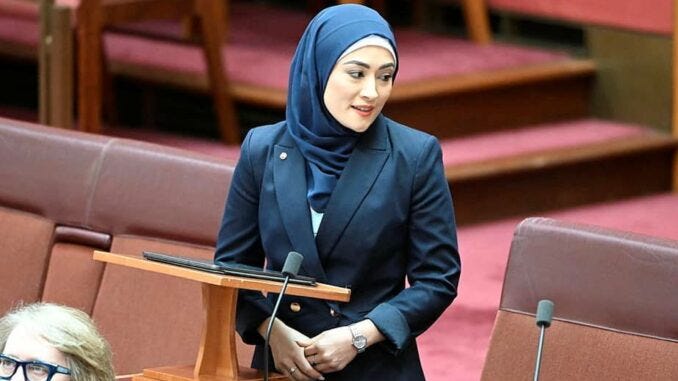Politics in Australia is a tough and brutal game—it's a bull pit where thuggery, backroom dealings, manipulation, and control receive subtle promotion by narcissists with personality disorders wreaking havoc.
Breaking party ranks requires a unique politician, a rarity in politics, especially for someone relatively new to the game.
Fatima Payman is that rare air - a newcomer in Australia's Senate, and her bravery speaking out against Labor’s reluctance to criticise Israel’s actions against Palestinians must be applauded.
However, the same cannot be said about Prime Minister Anthony Albanese. Albo has shown a considerable lack of leadership on a matter crucial to the identity of Australia and its moral standing.
Australians should be enraged about the political cowardice its leadership has shown toward Israel’s barbarity and genocidal mania, and yet they aren’t.
Senator Payman, however, appears to be a new breed of politician—one with a voice and moral conscience, fearless and not captured by the ADL or Israeli lobby.
God bless Fatima Payman.
Payman represents more than just Western Australia’s vibrant multicultural community—she is also one of the youngest women to ever sit in federal parliament.
Her remarkable journey from Kabul, Afghanistan, to the corridors of power in Canberra highlights her commitment to public service and community advocacy.
Senator Payman's early life was marked by her family's flight from the Taliban and subsequent refuge in Pakistan. In 2003, she followed her father to Australia, setting roots in Perth.
There, Payman faced and overcame considerable adversities, one being the loss of her father to leukemia in 2017, a life event that deepened her resolve to impact her community positively.
Before entering politics, Payman was actively involved in the Western Australian Police Muslim community advisory group, holding the position of secretary in the multicultural Labor branch. Payman’s leadership and dedication earned her the title of Muslim Role Model of the Year in 2022.
This week, Senator Payman stepped into the national spotlight by openly criticising the genocide being enacted by Israel in Gaza, labelling them as genocidal—it’s a call that has sparked both support and criticism within her own party.
Straying from the party line, Payman not only attacked the moral compass of Israel but the global and national leadership's response to the crisis. “I see our leaders performatively gesture defending the oppressors’ right to oppress while gaslighting the global community about Israel’s rights of self-defence,” Payman said.
Payman’s bold statement during a parliamentary session was a call to action, “How many international rights laws must Israel break for us to say enough? How many lives does it take to call this a genocide?”
Her words have stirred a variety of responses, from endorsement by human rights advocates to stark disapproval from some of her party's frontbenchers, including Prime Minister Anthony Albanese.
Albo should be ashamed. He has condemned Australia’s reputation as a country fair-minded and a defender of the underdog to a position of moral compromise and subservience.
This isn’t the Australian way or ethos.
Despite the backlash, Payman remains undeterred. She reaffirmed her commitment to human rights and peace on social media, promising to continue using her voice to challenge injustice and advocate for the oppressed.
As she navigates her role in Australian politics, Senator Payman’s recent actions and her call for a re-evaluation of Australia's foreign policy are a testament to her courage and commitment to ethical leadership.
Her approach may redefine how Australia addresses international conflicts and human rights issues in the future.
Senator Payman’s stance on Israel and Gaza is indicative of a broader commitment to address what she perceives as systemic injustices on a global scale, and her vocal disapproval of Israel’s policies, which she argues contravene international law, is also a reflection of her dedication to uphold the principles of human rights universally.
Payman’s comments have sparked a broader discussion within the Australian Labor Party and the public about the nature of Australia’s alliances and its role on the international stage.
The debate comes at a time when many within the party and beyond are calling for a reassessment of traditional foreign policy positions, suggesting a shift towards more progressive and humanitarian-based policies.
Her criticisms align with this shift, suggesting that Australia should take a more active role in promoting peace and justice globally, rather than merely following longstanding political alliances.
Moving forward, Senator Payman plans to continue engaging with both her constituents and colleagues to foster a deeper understanding of the issues at stake. She intends to lead initiatives that not only discuss these international issues but also bring attention to domestic policies that impact multicultural communities within Australia.
By doing so, she hopes to bridge the gap between local concerns and international human rights, ensuring that Australian policies are congruent with the values of justice and equity, both at home and abroad.
Her resolve to maintain this stance, despite potential political risks, underscores her commitment to her principles and her constituents.
As Senator Payman navigates the complexities of her role, her leadership is set to challenge the norms of Australian politics, potentially influencing a new generation of political leaders to think globally while acting locally.
It could mark a significant turn in how Australia addresses its foreign policy, particularly in relation to conflict zones and human rights issues worldwide.





Well brother I can't get everything right!!
Western/ NATO politicians have sold their souls to the dying empire. They are cowardly courtiers serving no useful purpose. Payman is an inspiration in dark times.